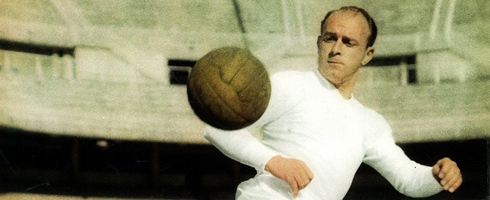Real Madrid legend Alfredo Di Stefano was one of the greatest players world football has ever seen, That is not an opinion, it is a universally acknowledged fact. He never played in a World Cup, but his death after suffering a heart attack at the weekend has cast a shadow over the present one.
Born in Argentina, Di Stefano found fame at Real Madrid where, as the original galactico, he spent eleven years starring in one of the greatest and most successful club sides of all time. He established a formidable partnership with the Hungarian striker Ferenc Puskas and won eight Spanish championships for Los Blancos between 1954 and 1964.
Di Stefano notched 308 goals in 396 appearances for Real Madrid and his 216 goals for them in La Liga was a club record until Raul Gonzalez eclipsed it in 2009. His 49-goal haul in 58 European Cup games had been the highest in that competition until Raul overhauled it too in 2005.
The blond arrow was on target in five consecutive European Cup finals for Los Blancos between 1956 and 1960, hitting a hat-trick in the last of those, an unforgettable 7-3 victory over Eintracht Frankfurt in Glasgow. That quintet of triumphs helped Di Stefano to lift the Ballon d’Or in both 1957 and 1959. The German side had been expected to win the game that many believe to have been the greatest ever display of European club football.
Ironically, it was almost accidental that Di Stefano joined Real Madrid in 1953. The capital club was a far from invincible force in Spanish football at that time, lagging behind Barcelona and Athletic Bilbao as well as city rivals Atletico. The Argentine was on the verge of signing for the Catalans when Madrid President Santiago Bernabeu persuaded him to join Los Blancos instead.
Barcelona claimed Di Stefano’s u-turn came about under pressure from Spain’s Fascist leader Francisco Franco, who notoriously derided outsiders and whose preference for Di Stefano to come to the capital was uncharacteristic. Amid all the fuss, the Argentine is said to have played poorly in his early appearances for Los Blancos, but he soon hit his stride and never looked back.
Blessed with electric pace as well as great stamina and vision, Di Stefano could play almost anywhere on the pitch, in stark contrast to modern-day players who baulk when asked to play ‘out of position.’ His versatility paved the way for the pioneers of total football and, although the link is rarely acknowledged, Rinus Michels, Johan Cruyff and their disciples owe the speedy Argentine a debt of gratitude.
Ending his playing career with Espanyol at the age of 40, Di Stefano took up various coaching roles after retiring, leading River Plate – the team he began his career with – and Boca Juniors to title victories in Argentina. He won La Liga, the European Cup Winners’ Cup and the Copa del Rey with Valencia and also managed Sporting Lisbon as well as having two brief spells in charge of Real Madrid, collecting five runners-up titles in 1982-83.
After playing only six times for his home country, Di Stefano gained Spanish citizenship and earned 31 caps for La Roja, hitting 23 goals in the process. He never had a chance to shine on the World Cup stage with either nation, a fact that might just inspire today’s great Argentine, Lionel Messi, to go one better in memory of the blonde arrow.

